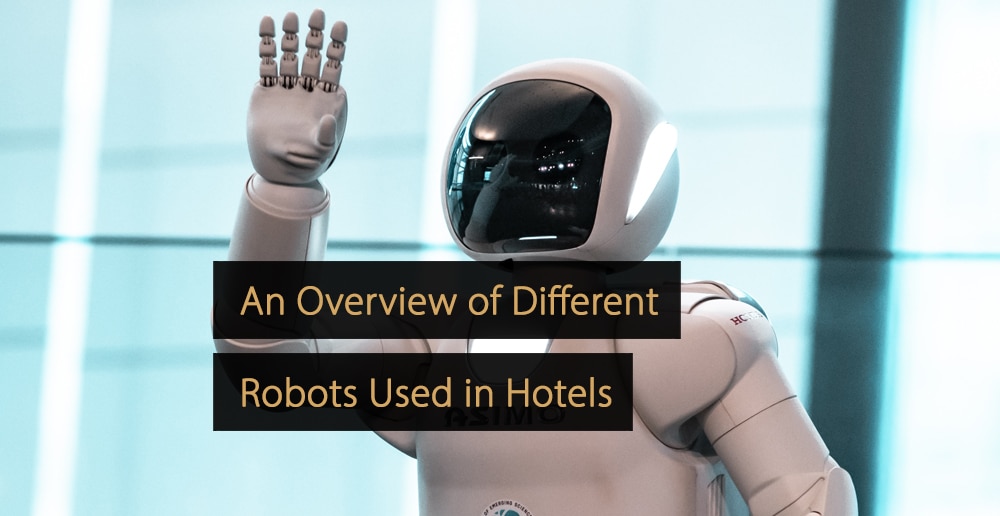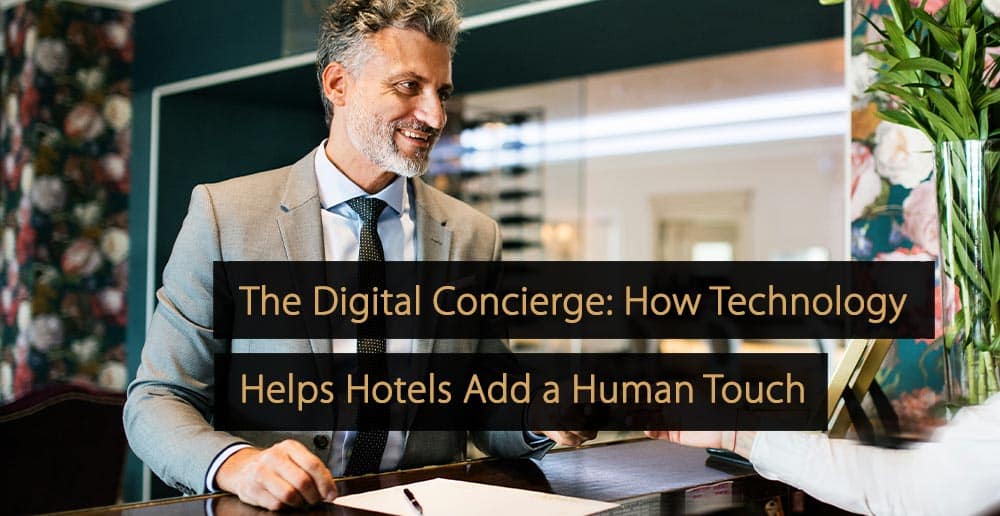Hotel robots represent some of the most effective forms of hospitality technology, and their presence will help ensure superior guest satisfaction. As a growing number of properties are employing these autonomous “smart” services, it only stands to reason that we examine these robots in greater detail. Benefits can your property expect to enjoy?
Table of Contents:
- What are Robots?
- Why are Hotel Robots Becoming More Popular?
- Some Examples of Robots Used in Hotels
- A Quick Look at Two Hotels Currently Employing This Type of Hospitality Technology
- What are the Advantages of Hotel Robots?
- What Are The Disadvantages Of Hotel Robots?
- Why Contactless Payments Are Becoming Vital Within The Hotel Industry
- What Are The Benefits of Mobile Check-In Apps for Hotels
- 11 More Hotel Marketing Trends
- More Hotel Technology Tips
What are Robots?
Generally, a robot is any device or system engineered to execute a specific set of tasks, such as unparalleled efficiency and precision. Examples include robots intended to work within an assembly line and CNC machines designed to create extremely complex parts in a fraction of the time a human would otherwise require. Regarding the hotel industry, the primary purpose of robots is to enhance and expedite the overall guest experience. As we will see, this can be accomplished in several different ways.
Why are Hotel Robots Becoming More Popular?
There are several reasons for this trend. From a financial point of view, hospitality technology is becoming cheaper to implement. This signifies that even smaller properties like boutique hotels can leverage the advantages. However, we also need to keep in mind that the guests’ requirements are beginning to change. Thanks to wireless connectivity and the ubiquitous presence of smartphones, customers have come to expect second-to-none service levels during their stay. This involves the presence of technology to a certain degree. Hotel robots can offer such a competitive advantage, so it only stands to reason managers are choosing to take advantage of such opportunities.
Some Examples of Robots Used in Hotels
As you may have already imagined, there are many types of hotel robots, each intended to suit a unique purpose. This is why it is a good idea to look at a handful of the most common robots in hospitality and what tasks each has been designed to address.
1. Robots Intended to Greet Guests
Sometimes referred to by titles such as “guest ambassadors“, these robots are placed strategically within a property to answer common questions. Examples include the location of elevators, the ability to give directions to a specific room, or even to recommend certain types of food. The humanoid-like appearance of these robots is likewise intended to provide a decidedly welcoming appeal to the property in question, ideal when staff members may not be immediately able to cater to guests’ needs during busier times of the year.
Video: Hotel Robot Greets Guets in Mandarin Oriental Hotel, Las Vegas
2. Robots Dealing with Housekeeping
Housekeeping is an important concern within a property, and as a result, hotel robots have been designed to carry out various services. Let us take a closer look at a handful of options that hotel management should consider.
One type of robot has been specifically engineered to clean and disinfect services that might have been exposed to germs or bacteria. This is of critical importance in this day and age due to the recent COVID-19 outbreak. Hotels employing such highly precise devices will likely enjoy amenable retention rates.
Video: Hotels Are Using Germ-Killing Robots to Cleanse Rooms
Another robot design focuses on generalized services, such as providing bins of fresh linen to the appropriate floors. This can help reduce manual labor, and as a result, guests will be provided with clean towels and sheets in a timely fashion, increasing overall satisfaction levels.
Video: Hotel Robots Which Support Housekeeping
Floor-cleaning hotel robots are also quite popular, as they can enter rooms once the guests have departed to ensure a clean environment for new arrivals. While this concept has existed within the domestic sector for some time, hotels are now beginning to realize its advantages.
Video: Robot Maid for Cleaner Floors
3. Hotel Robot Which Delivers RoomService
Some robots have likewise been designed to provide bespoke room service options to guests. These tiny marvels will be supplied with food from the hotel kitchen before delivering it to a specific room. Not only does this ensure that all meals are provided fresh, but guests are no longer required to leave their premises to enjoy a delectable selection of foods.
Video: Meet Robots Jeno and Jena at Hotel Jen in Singapore
4. Hotel Robots Are The Waiters At This Restaurant
Hotel robots can even double as waiters. Some are affixed to a set of tracks, while others can move freely around a restaurant. Both are capable of taking orders as well as delivering food to guests. Such methods can help hotel management reduce labor costs while still ensuring high customer satisfaction.
Video: Robots Are The Waiters At This Restaurant
5. Hotel Robots Who Do The Cooking
Other robots can cook meals for guests. Not only can such mechanisms be programmed to create highly complex dishes, but their levels of accuracy can accommodate specific tastes, such as gluten-free and low-calorie dishes. Furthermore, these methods can be useful if bulk meals need to be prepared in a timely fashion (such as when catering to the needs of a large in-house convention).
Video: Robots Cooking: The Restaurant of the Future
A Quick Look at Two Hotels Currently Employing This Type of Hospitality Technology
As we can see, there are numerous advantages associated with modern hotel robots. Let’s now take a look at two properties that have already begun to leverage these benefits. There is no doubt that these examples are only the beginnings of a growing trend throughout the entire hospitality sector.
Robots Take Over Luggage Duties at Sheraton Los Angeles
The Sheraton Los Angeles San Gabriel Hotel is learning to embrace a smart and automated edge. Management has now placed robots in strategic positions to cater to the needs of their guests. Some everyday tasks include greeting new arrivals, handling luggage, leading guests to specific destinations within the hotel, and offering room service. During peak hotel seasons, the presence of these robots will prove to be an invaluable asset.
Video: Robots Take Over Luggage Duties at Sheraton Los Angeles San Gabriel
Alibaba’s Robot Hotel
Alibaba’s FlyZoo Hotel has been dubbed the “hotel of the future” thanks to the presence of robots. Centered around a bespoke mobile application, common issues such as checking in and access via facial recognition have been dramatically streamlined. These methods are primarily accomplished through the use of artificial intelligence. Voice-activated room service bots are likewise complemented by the presence of autonomous smart machines which deliver room service to guests when required.
Video: Go Inside Alibaba’s FlyZoo Future Hotel
What are the Advantages of Hotel Robots?
One of the main advantages involves a second-to-none level of in-house automation, freeing up staff members to perform other guest-related tasks. Also, hotel robots can perform around-the-clock functions that might be impossible for employees. Many requirements can be completed with a higher level of precision when compared to human counterparts. Finally, the presence of robots provides a hotel with a genuinely cutting-edge appeal.
What are the Disadvantages of Hotel Robots?
A handful of potential drawbacks should also be mentioned. Of course, a human will need to address some tasks (such as addressing a question that has not been pre-programmed by staff). Another pitfall is that many guests still wish to enjoy the human touch during their stay. Some patrons may not appreciate the somewhat “cold” nature of even the most advanced hotel robots. To put it simply, the majority of robots are incapable of providing a truly personal touch.
Why Contactless Payments Are Becoming Vital Within The Hotel Industry
The article “Contactless Payments Are Becoming More Important Within Hospitality” provides an in-depth overview of why wireless payment methods play an increasingly important role in hospitality technology. Contactless payments offer guests a streamlined means to confirm reservations, pay for services, and expedite check-in. Not only do these forms of payment boast a decidedly user-friendly appeal, but their secure nature ensures that guest information remains safe at all times.
What Are The Benefits of Mobile Check-In Apps for Hotels
In the article “Mobile Check-In App for Hotels: What Are The Benefits?”, we briefly examine why this type of hotel technology has become commonplace within such a competitive industry. Some of the advantages discussed include (but are not limited to) an enhanced customer experience, quicker check-in times, the ability to increase brand loyalty, and the option to add other lucrative offers within a bespoke mobile application. These traits will help ensure that the property in question remains one step ahead of the competition.
More Hotel Marketing Trends
The article “Hotel Marketing Trends: Upcoming Innovations You Must Know” illustrates a plethora of unique technological advancements that are set to transform the entire sector. These represent some of the many hotel trends focused on how technological innovations are set to change the guest experience. Hotel technology highlighted within this article includes service automation, facial recognition systems, robots, and the increasing presence of artificial intelligence. These are reasons why hotel management is keen to capitalize upon such unique opportunities.
Hotel robots are transforming the hospitality industry. As these smart machines continue to evolve, there is no doubt that they will impact business processes and end-user experiences. This is why it is prudent for hotel management to understand the benefits and consider implementing robots within their organizations.
More Hotel Technology Tips
Technology plays a significant role in the hotel industry, and its presence is expected to increase in the coming years. In the following articles, you will learn more about hotel technology:
- 10 Reasons Why Every Hotel Needs a Hotel Chatbot
- Hotel Technology Trends: 11 Upcoming Innovations You Must Know
- How Can Voice Control Benefit the Hospitality Industry?
- Smart Hotel; What Are the Benefits for Hotel Owners and Guests?
- How to Use Artificial Intelligence in the Hospitality Industry
- All Hotel & Hospitality Technology tips
More Tips to Grow Your Business
Revfine.com is the leading knowledge platform for the hospitality and travel industry. Professionals use our insights, strategies, and actionable tips to get inspired, optimize revenue, innovate processes, and improve customer experience.Explore expert advice on management, marketing, revenue management, operations, software, and technology in our dedicated Hotel, Hospitality, and Travel & Tourism categories.
This article is written by:
Hi, I am Martijn Barten, founder of Revfine.com. With 20 years of experience in the hospitality industry, I specialize in optimizing revenue by combining revenue management with marketing strategies. I have successfully developed, implemented, and managed revenue management and marketing strategies for individual properties and multi-property portfolios.









Leave A Comment